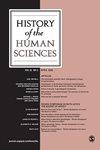重温“达尔文-马克思通信”:多重发现与优先权修辞
IF 0.5
2区 历史学
Q2 HISTORY & PHILOSOPHY OF SCIENCE
引用次数: 0
摘要
在20世纪30年代至70年代中期,人们普遍认为,1880年卡尔·马克思曾提议将《资本论》的一卷或译本献给查尔斯·达尔文,但达尔文拒绝了。学者们经常将这一细节解释为对达尔文进化生物学与马克思主义政治经济学之间的关系问题具有更大的意义。1973-4年,两位独立工作的学者——多伦多大学社会学教授Lewis Feuer和伯克利大学研究生Margaret Fay——同时认定,基于对相关信件的长期误解,拟议奉献的传统故事是不真实的。在两人之间,以及其他几位成为他们各自盟友的学者之间,对这一发现展开了权威和优先权的竞争。从1975年到1982年,这场争论在学术和大众出版物中都产生了大量的泼墨。利用以前未经审查的档案资源,本文重新审视了所谓的“达尔文-马克思通信”的“案例”,作为“多重发现”现象的一个例子。多重发现在自然科学中很常见,但在人文科学和社会科学中却很少见。目前的思想史上的优先权争议遵循了自然科学中常见的此类争议模式,同时也以揭示学科规范和研究基础设施重要性的方式与之不同。本文章由计算机程序翻译,如有差异,请以英文原文为准。
Revisiting the ‘Darwin–Marx correspondence’: Multiple discovery and the rhetoric of priority
Between the 1930s and the mid 1970s, it was commonly believed that in 1880 Karl Marx had proposed to dedicate to Charles Darwin a volume or translation of Capital but that Darwin had refused. The detail was often interpreted by scholars as having larger significance for the question of the relationship between Darwinian evolutionary biology and Marxist political economy. In 1973–4, two scholars working independently—Lewis Feuer, professor of sociology at Toronto, and Margaret Fay, a graduate student at Berkeley—determined simultaneously that the traditional story of the proposed dedication was untrue, being based on a long-standing misinterpretation of the relevant correspondence. Between the two, and among several other scholars who became their respective allies, there developed a contest of authority and priority over the discovery. From 1975 to 1982, the controversy generated a considerable volume of spilled ink in both scholarly and popular publications. Drawing on previously unexamined archival resources, this article revisits the ‘case’ of the so-called ‘Darwin–Marx correspondence’ as an instance of the phenomenon of ‘multiple discovery’. A familiar occurrence in the natural sciences, multiple discovery is rarer in the humanities and social sciences. The present case of a priority dispute in the history of ideas followed patterns familiar from such disputes in the natural sciences, while also diverging from them in ways that shed light on the significance of disciplinary norms and research infrastructures.
求助全文
通过发布文献求助,成功后即可免费获取论文全文。
去求助
来源期刊

History of the Human Sciences
综合性期刊-科学史与科学哲学
CiteScore
1.60
自引率
11.10%
发文量
31
审稿时长
>12 weeks
期刊介绍:
History of the Human Sciences aims to expand our understanding of the human world through a broad interdisciplinary approach. The journal will bring you critical articles from sociology, psychology, anthropology and politics, and link their interests with those of philosophy, literary criticism, art history, linguistics, psychoanalysis, aesthetics and law.
 求助内容:
求助内容: 应助结果提醒方式:
应助结果提醒方式:


